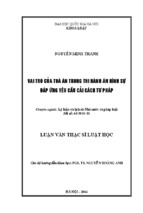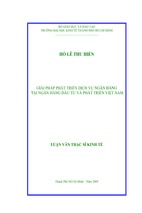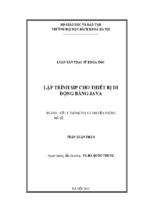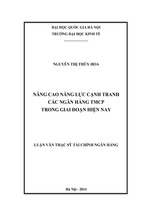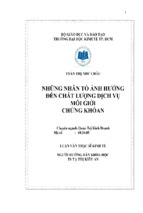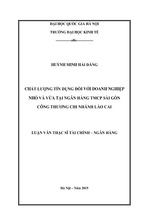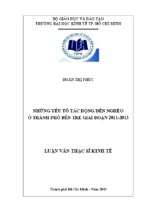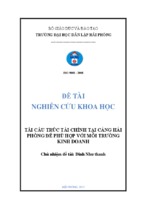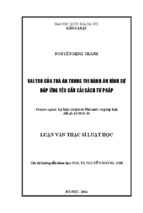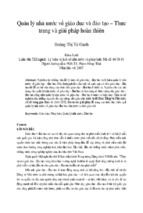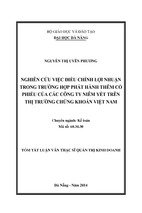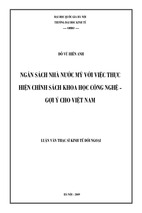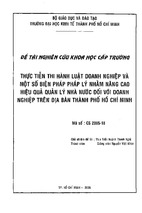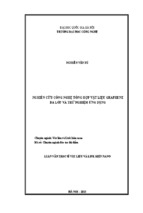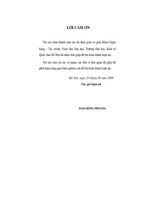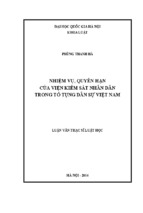MINISTRY OF EDUCATION AND TRAINING
BA RIA VUNG TAU UNIVERSITY
NGO LY TAN THUY
SPEAKING SKILL EVALUATION FOR SECONDARY STUDENTS AT UK ACADEMY
SCHOOL (BA RIA VUNG TAU PROVINCE): A TEACHERS’ PERCEPTION STUDY
Major: Theory and Methodology of English Language Teaching
Course code: 8140111
MASTER THESIS IN TEACHING ENGLISH TO SPEAKERS OF
OTHER LANGUAGE
Supervised by
Assoc.Prof. Phạm Huu Duc, Ph.D.
BA RIA VUNG TAU- 2022
i
DECLARATION BY AUTHOR
I, the undersigned, hereby certify that the thesis entitled “Speaking skill
evaluation for secondary students at UK Academy school (Ba Ria Vung Tau
province): a teachers’ perception study” is the result of my own research for the
Degree of Master of Arts in English Language. The substance of the thesis has
not, wholly or in part, been submitted for any other degree to any other
universities or institutions.
Except where reference has been made in the text, this thesis contains no
material previously published or written by another person.
The study reported in this thesis was approved by the Graduate Faculty of Ba
Ria Vung Tau university.
Author’s Signature
Ngô Lý Tấn Thủy
ii
CERTIFICATE OF ORIGINALITY
I certify my authorship of the Master’s Thesis submitted today entitled:
Speaking skill evaluation for secondary students at UK Academy school (Ba
Ria Vung Tau province): a teachers’ perception study. In terms of the
statement of requirements for Theses in Master’s programs issued by Higher
Degree Committee of Postgraduate Institute, Ba Ria Vung Tau University
Ba Ria Vung Tau province, 2022
NGO LY TAN THUY
iii
RETENTION AND USE OF THE THESIS
I hereby state that I, Ngo Ly Tan Thuy, being a candidate for the degree of
TESOL accept the requirements of the University relating to the retention and
use of Master’s Theses deposited in the library.
In terms of these conditions, I agree that the original of my Master’s Thesis
deposited in the library should be accessible for purposes of study and research,
in accordance with the normal conditions established by the Librarian for the
care, loan, and reproduction for theses.
Ba Ria Vung Tau, September 2022
Signature ……………………
Ngo Ly Tan Thuy
iv
ACKNOWLEDGEMENTS
In order to complete the thesis “Speaking skill evaluation for secondary
students at UK Academy school (Ba Ria Vung Tau province): a teachers’
perception study”, the author has been supported by many people. Through this
opportunity, I would like to express my gratitude to these people for helping me
finish this thesis.
First of all, I would like to express my genuine appreciation to Assoc. Prof.
Phạm Hữu Đức, Ph.D, my supervisor, for his considerate guidance and his
passionate inspiration as well as his thorough explanation on my research
paper.
Secondly, I would like to thank Mr. Pierre and Mr. Robin, Mr Alex, my
colleague at UK Academy School for supporting me during my research.
Thirdly, I am very thankful for all the participants of this study, who have
cooperatively taken part in taking questionnaires as well as contributed their
opinions on the textbook and the course.
In addition, I would like to thank all of the lecturers who gave me interesting
lessons, dedication and advice during my study at Ba Ria Vung Tau University.
Last but not least, I must express my appreciation to my superior at my
workplace who has encouraged me to continue my learning path and has always
believed in my ability to complete this thesis and to have a brighter future.
v
TABLE CONTENTS
DECLARATION BY AUTHOR ................................................................................... ii
CERTIFICATE OF ORIGINALITY ............................................................................ iii
RETENTION AND USE OF THE THESIS ..................................................................iv
ACKNOWLEDGEMENTS ............................................................................................ v
ABSTRACT .................................................................................................................... 3
LIST OF TABLES ..........................................................................................................4
CHAPTER 1: INTRODUCTION.................................................................................... 5
1.1 Rationale ................................................................................................................5
1.2 Aims of the study...................................................................................................8
1.3 Research questions ................................................................................................ 8
1.4 Scope of the study .................................................................................................8
1.5 Significance of the study ....................................................................................... 9
1.6 Research methods ..................................................................................................9
1.7 Structure of the study............................................................................................. 9
CHAPTER 2: LITERATURE REVIEW.......................................................................11
2.1. The role of teaching speaking............................................................................11
2.1.1. Definition of Speaking ................................................................................11
2.1.2. Characteristics of speaking ..........................................................................12
2.1.3. Importance of speaking ...............................................................................13
2.1.4. The Factors of Speaking Skills ....................................................................15
2.1.5. Types of Speaking Performance ..................................................................15
2.1.6. Factors Affecting the Students' Performance in Speaking Activities .........16
2.1.7. The Roles of the Teacher in Speaking Class ..............................................18
2.2 Materials evaluation ............................................................................................ 20
2.2.1 Definition of materials evaluation ................................................................ 20
2.2.2 Reasons for materials evaluation ..................................................................21
2.2.3 Types of materials’ evaluation .....................................................................22
2.2.4 Approaches and Criteria for materials evaluation ........................................24
2.3. Speaking skill evaluation .................................................................................... 27
2.3.1. Definition of speaking skill evaluation ....................................................... 27
1
2.3.2
. The advantages of classroom evaluation ................................................28
2.3.3 Reasons for speaking skill evaluation .......................................................... 34
2.3.4. Teaching speaking skill ...............................................................................35
2.4. Previous studies on ELT speaking .....................................................................39
2.4.1.
Nature of oral skills ...............................................................................40
2.4.2.
Evaluation of speaking skills .................................................................42
2.5. Conceptual framework ..................................................................................... 45
CHAPTER 3: METHODOLOGY .................................................................................46
3.1. Research design ..................................................................................................46
3.2. Research participants .......................................................................................... 46
3.3. Data collection instruments ................................................................................48
3.3.1. Questionnaires ............................................................................................. 48
3.3.2. Interviews ....................................................................................................50
3.4. Data collection procedures .................................................................................51
3.5. Data analysis .......................................................................................................52
3.6. Summary.............................................................................................................53
CHAPTER 4: RESULTS AND DISCUSSION ............................................................ 54
4.1. Findings ..............................................................................................................56
4.1.1 The current status of classroom speaking evaluation conducted in UK
Academy school ....................................................................................................56
4.1.2. Teachers’ perceptions of the effectiveness of classroom speaking
evaluation...............................................................................................................60
4.2. Discussion ...........................................................................................................62
CHAPTER 5. CONCLUSIONS AND SUGGESTIONS ..............................................64
5.1. Conclusions ........................................................................................................64
5.2. Implication ..........................................................................................................65
5.3. Limitation ...........................................................................................................66
5.4. Suggestions for further research .........................................................................66
REFERENCES ..............................................................................................................68
APPENDIXES ...............................................................................................................73
2
ABSTRACT
It is widely known that language acts as a crucial and characteristic product
of every country according to the fact that it is the typical nature of each
country. Once students are exposed to an international language, they must
master four skills, especially listening, speaking, reading, and writing in order
to effectively master and use it. Among the above four skills, oral English is
probably considered to be one that requires a lot of study and practice time. A
large number of students encountered challenges in early phonetic learning. In
fact, a decent language acquisition is one of the keys for students to gradually
open the door to this magical language. The aim of the study is to evaluate the
speaking skill of secondary students at UK Academy School in Ba Ria city, Ba
Ria Vung Tau province to investigate whether the students using their language
ability through their speaking skill suitably meet the requirements of the school
curriculum in terms of their language proficiency and especially the speaking
skill. Teacher-based speaking evaluation conducted in the classroom are not
only strongly recommended at UK Academy policies but are also the only tool
used to evaluate students’ speaking skills in the formal schooling system. The
data was collected from questionnaires and interviews of 26 English teachers
who are recently working at UK Academy school. The result of the survey
showed that the teaching quality and the curriculum of school highly met the
stakeholder’s requirements in terms of aims. The research also suggested the
designing aspect of materials and teaching methods to make them more
interesting for students to learn how to speak English better.
3
LIST OF TABLES
Table 4.1: Purpose of classroom speaking evaluation .................................... 56
Table 4.2. The importance of classroom speaking evaluation ........................ 57
Table 4.3. Using methods of evaluation ........................................................ 58
Table 4.4. Test tasks/activities used in classroom speaking evaluation ......... 59
Table 4.5. The classroom speaking evaluation meet the school’s
requirements .................................................................................................... 60
Table 4.6. The classroom speaking evaluation meet the
school’s output (B1) ........................................................................................ 60
4
CHAPTER 1: INTRODUCTION
1.1 Rationale
It is widely known that language acts as a crucial and characteristic product
of every country according to the fact that it is the typical nature of each
country. Once students are exposed to an international language, they must
master four skills, especially listening, speaking, reading, and writing in order to
effectively master and use it. Among the above four skills, oral English is
probably considered to be one that requires a lot of study and practice time. A
large number of students encountered challenges in early phonetic learning. In
fact, a decent language acquisition is one of the keys for students to gradually
open the door to this magical language.
It is globally known that English, as the most popular language used by
people in the world, English is a great second language to learn, whether it is for
personal reasons, daily routine, travel or business. Learning any new language
takes hard work, commitment, and a desire to make mistakes. Similarly,
Learning English is not an exception. English is taught in all schools in Vietnam
and at all stages of education, from kindergarten to university. However, if you
take into account the users of the second language, the problem is here, it is
difficult to rule out, people respond better to the language they develop. To
effectively sell products to people, it is not enough to speak a language they
understand, especially when their understanding is limited. You must talk to
them in the language they use in their hearts.
There is a reason why the demand for learning English nowadays is
booming. English has been periodically crowned as “the global language,”
especially in the international school, oral language is more and more important
for students so that they can challenge themselves and go out the world. So,
5
speaking skill is one of the most significant factors to help them achieve their
goal leading to the bright future.
UK Academy bilingual school in Ba Ria city, Ba Ria Vung Tau province was
founded on June 2016. During the past 5 years with all effort of UK Academy
teachers and staff, the academy has been recognized and appreciated for its
training quality by the modern and integrated teaching method it is one of the
education system that takes humanity as philosophy, UK Academy provides
pupils the foundation for comprehensive development, from learning, skills to
physical health through the combination of seven programs: Cambridge English
International program, Program of the Ministry of Education and Training,
Living skill and Living value program; British music Program, Junior Business
Program JA (Junior Achievement), STEM (Science Technology Engineer Math)
Robotics in combination with utmost physical development program.
Learning in UK Academy, the students are ready to be integrated into the
international program to accomplish high school with 2 certificates. MOET
(Ministry of education and Training) diploma and IFY (International Foundation
Year) certificate to be equipped in standard output of English correlative to each
learning grade and developed by 4H educational philosophy: Heart (establish
sustainable foundation on motion for children), Health (Establish physical
development foundation, develop height and overall spiritual for children); Head
(develop at at most child’s intelligence); Hand (drill, generate goods and useful
habits). These 4 educational criteria of philosophy generate comprehensive
humanitarian capacity.
At UK Academy school, the curriculum was designed to help the students to
comprehensively develop 4 skills: active listening, speaking confidently, reading
for thoughts and creative writing to acquire necessary academic skills such as
responding thinking, teamwork, researching and communicating naturally as
6
native speakers, to be prepared to take examination for English Cambridge
certificate after each class and grade. It also helps students master the English
Moet program to make sure that they can take the national examination.
In the teaching speaking skill, teachers have been using more than 3 kinds of
book to train students and having them familiarizing with special tests like those
in the MOET program and the IELTS program, and practical knowledge is
brought to them through extra materials that would be really useful for their
further study and their future. However, up to now, some drawbacks have been
found that many students are not able to improve their speaking skills.
Additionally, the 10th grade and the 11th grade students still find it hard to be
good at speaking skill. Furthermore, together with some subjective reasons
beyond the school expectation, it seems obviously necessary to conduct the
research on evaluation of this skill. The findings of the study, hopefully, will
help the researcher and teachers of English department to improve or change the
materials, and more importantly, to promote their language teaching. On those
above-mentioned grounds, the researcher has decided to undertake this study to
evaluate whether the speaking skill suitably meets the requirements of the
school output in terms of learning and teaching.
At UK Academy school, the focus has been on the speaking skill since the
establishment of UK Academy school as this skill is designated to those in grade
11 and 12 students. Since its first use in teaching, there has been no official
evaluation from researchers or teachers conducted to review the suitable
methodology for teaching this skill. Furthermore, complaints about the problems
arising during the learning process regularly emerge, especially the complaints
on the teaching methods, vocabulary and pronunciation. Moreover, some
teachers still question the relevance of this skill students’ needs. Therefore, a
study to evaluate teaching and learning speaking skill is urgently needed.
7
1.2 Aims of the study
The aim of the study is to evaluate and improve the speaking skill of
secondary students at UKA school to investigate whether the teaching methods
are suitable for students and whether students’ speaking fluency suitably meets
the requirements of school output in term of teaching and learning speaking.
The findings will help teachers to adjust the teaching methods and
materials so that they can optimize and adapt strong points, or substitute weak
points from other related teaching methods and materials to meet the school
objective. Furthermore, it is expected that the results of the research, to some
extent, could help secondary students at UKA school get over their obstacles of
speaking skill in class as well as outside school.
1.3 Research questions
This study aims to find out the answer to the following research questions:
1. What is the current status of classroom speaking skill evaluation conducted
in UK Academy school?
2. What are teachers’ perceptions of the effectiveness of classroom speaking
skill evaluation?
1.4 Scope of the study
In materials evaluation, there have been a number of criteria that should be
taken into consideration, such as the content, the methodology, the layout, the
authenticity, and so on. It will be highly precious to conduct a comprehensive
evaluation of the speaking skill. However, within the scope of a minor thesis, the
criteria for evaluation with the focus on two criteria: teaching and learning
speaking skill.
Materials evaluation is a complicated process that requires taking various
factors into consideration. However, due to the limited time and the ability of
the researcher, the study just focuses on analyzing the teaching and learning
8
speaking skill and the material, along with questionnaires which will be given to
the selected 20 students of the academy secondary at UK Academy school. One
of the most difficult skills for students is speaking skill. It is proved that there
are not many students speaking English fluently at UK Academy school. The
size of each class at UK Academy is maximum 25 to 30 students. The researcher
selected 20 out of 25 students based on their speaking skill, their general
knowledge, and their adequate class attendance.
1.5 Significance of the study
The study will be useful to students, teachers and researchers in the field of
teaching and learning speaking skill. The results are expected to provide a more
helpful and effective way in teaching and learning speaking skill. The results
also reflect the strengths and weaknesses of the teaching methods of teachers
and the learning ways of students, so that teachers can find appropriate teaching
methods for students in speaking skill training. For researchers who share the
same interest in this topic, this study could serve as a reliable source of reference
in their studies.
1.6 Research methods
In order to achieve the aim, a mix-method approach (quantitative and
qualitative research) is used in the study. The data will be collected via a survey
questionnaire and an interview.
1.7 Structure of the study
The thesis structure is divided into five chapters:
Chapter 1 is the Introduction. In this part, the rationale, the aims, the research
questions, the scope of the study, the significance of the study, the methods of
the study and the structure of the study are presented.
9
Chapter 2 is the Literature Review which includes a theoretical background of
speaking evaluation, previous studies on evaluation as well as some information
related to the speaking skill.
Chapter 3 is the Methodology which mentions research questions, research
method, data collection instruments, investigates the participants.
Chapter 4 is Findings and Discussions. This part shows some findings concluded
from the data analysis, summary of findings and discussion.
Chapter 5 is Conclusion and Suggestions
10
CHAPTER 2: LITERATURE REVIEW
2.1. The role of teaching speaking
2.1.1. Definition of Speaking
According to Bygate, speaking skill is defined as “Oral expression
involves not only the use of the right sounds in the patterns of rhythm and
intonation, but also the choice of words and inflections in the right order to
convey the right meaning” (as cited in Mackey, 1965, p.266). Auditory
communication consists of short, fragmentary utterances, in an exceedingly
range of pronunciation. There is often an excellent deal of repetition and overlap
between one speaker and another, and speakers usually use non-specific
references. They also imply that in speaking the loosely organized syntax, and
non-specific words and phrases are used, auditory communication is, therefore,
made to feel less conceptually dense than communication. More importantly,
speaking skill, or productive skills, is thought to possess two main forms of
conversation namely, dialogue and monologue, which are rather different
(Brown & Yule, 1983). In monologue, it is said that they give uninterrupted
speechmaking while in dialogue learners interact with one or more other
speakers for transactional and international purposes.
It can be seen from the two productive language skills that spoken language is
different from the writing counterpart, whether they are processing conditions or
reciprocal conditions. Spoken language is affected by time constraints and
problems related to planning, memory and the production of stress. Then, it is a
reciprocal activity, which has a crucial influence on the type of decision to be
made. take (Bygate, 1987, p. 1112).
Speaking skill is the most significant skill that is crucial to be mastered by most
language learners. As we know that speaking skill is the verbal utilization of
language to interact or communicate with others. There are many definitions of
11
speaking skill in English. Various linguists indicate concept of speaking in
various ways. In Byrne’s view (1986), speaking skill is one of two ways of oral
communication process, and is the productive skill. The speaker has to conceal
the message he wants to transfer in sensible language, while the listeners have to
figure out (or interpret) the message. Chaney and Burk (1998) explained that
speaking is “the process of building and sharing meaning through the use of
verbal and non-verbal symbols, in a diversity of contexts” (Chaney and Burk,
1998, p.113). Spratts et al. (2005) indicate speaking is a productive skill that
involves using speech to show meanings to other people. Florez (2005) has
comprehensive definition when interpreting that speaking is “an interactive
process of building meaning that combines produce, receive and process
information”. It is obvious that speaking is an activity including two or more
people in which the attendants are both the speakers and listeners who have to
act what they listen and make their improvement in this activity.
2.1.2. Characteristics of speaking
According to (Bygate, 1985), it can almost be said that the interlocuters in
conversations can correct each other, and can also usually show agreement and
understanding or misunderstanding and disagreement. Unlike readers or writers,
speakers may also need patience and imagination. When speaking, the speakers
should pay attention to each other so that the listener has the opportunity to
speak. This means that we often take turns to speak. To be more specific, Bygate
(1987) indicates that conversation or dialogue can be analyzed in terms of
routines, which are conventional ways of expressing information. Hence, there
are two types of routines: information routines and interactional ones.
Information routines may be defined to include two sub-routines: evaluation
and expository. The former involves narration, description, instruction and
comparison. The latter include justification, prediction, explanation, preference
12
and decision. Interaction routines are routines based not so much on sequences
of types of term arising untypical types of interactions. Moreover, these routines
can be characterized in broad terms involving the kinds of turns typically
occurring in given situations and the order in which the components are likely to
occur. So, interview conversations, casual encounters, telephone conversations,
conversations at parties, lessons, television or radio interviews, all tend to be
organized in characteristic ways.
Therefore, in learning speaking skills, the students can be much more
confident with clear comprehension and governing these skills. besides, the oral
skills base much on knowledge of language they can study such as vocabulary,
pronunciation and grammar. Moreover, students rely on common conventional
expression of communicating specific meanings, particularly on the language
environment. It is clear that practicing in classroom might not be same as oral
communication
outside
classroom.
In
a
foreign
language
classroom
environment, practice is quite simple and far from our real life.
It is undeniable that speaking skill is a key leading to communication. By
regarding to what good speakers do, what speaking tasks can be used in
classroom, and what specific needs students report, teachers or trainer can help
students advance their speaking skill and general oral competence.
2.1.3. Importance of speaking
Acting as one of the four key language skills (others being listening, writing
and reading), speaking is the means through which students can communicate
with others to achieve certain goals or to express their viewpoints, hopes,
intentions and opinions. Apart from it, people who notice a language are referred
to as ‘speakers’ of that language. Furthermore, in almost any setting, speaking is
the most frequently used language skills. As argued by Rivers (1981), speaking
is used twice as much as writing and reading in our communication.
13
Also, Pattison (1992) indicates that when people discuss knowing or
learning a language, they imply being able to speak that language. In a social
context, social role seems to be accomplished by those who know and learn how
to speak the language, but not by those who do not have such skills. It cannot be
rejected that speaking deserves as much consideration as or even more attention
than writing skills. In order to accomplish many of the most basic transactions, it
is essential for learners to speak with assurance.
In other words, speaking is the most significant skills among the others in
learning any language. It is the main skills that language learners have to acquire
after language learning process. As Nunan (1999) indicated that “if listening is
the Cinderella skills in the second language learning, then speaking is the overbearing elder sister. The possibility to function in another language is generally
featured in terms of being able to speak that language”. This saying shows that
the ability to speak is the most crucial aspect that students should advance. Also,
Goh and Burns (2012) claimed that “the mastery of speaking in English is a
priority for many second language learners. Learners often assess their success
in language learning, as well as the effectiveness of their English course, on the
basis of how well they feel they have improved in their spoken language”.
Depending on this statement, the students’ accomplishment in learning a
language is demonstrated by how well they can speak and practice it in daily
routine. On another aspect, Burkart (1998, p.1) also declared that “Many
language learners regard speaking capability as the measurement of acquiring a
language. He determined fluency as the ability to converse with others, much
more than the ability to comprehend, read or write speaking language. They
consider speaking skill as the most significant skills and they assess their
progress as regards their accomplishments in spoken communication”. It is clear
that speaking skill plays a pivotal role in students’ language learning and
14
acquisition because of the fact that the mastery of a language is assessed by how
well students do the speaking skill in that language.
2.1.4. The Factors of Speaking Skills
There is no language skill that is so difficult to evaluate with precision as
speaking capacity, and for this reason it seemed brilliant to defer our attention of
oral production tests until last. Additionally, some of the issues involved in the
evaluation of speaking skill happen in other forms of language testing. Familiar
with writing, speaking is a complicated skill that requires the simultaneous use
of a number of different abilities develop at different rates. Five components are
generally admitted in analyses of the speech process:
- Pronunciation involving the segmental features-vowels, semi-vowels,
consonants and the stress and intonation patterns;
- Grammar;
- Vocabulary;
- Fluency: be able to speak a language smoothly and easily;
- Comprehension. Oral communication certainly meet the demand of a
subject to respond to speech as well as to commence it.
The five factors of speaking skill above play a really significant role in
speaking. By advancing all the elements, people can create good speech.
2.1.5. Types of Speaking Performance
Brown (2004, p.271) defines six types of speaking skills. These six types
are as follows:
a. Imitative
This type requires the ability to learn an intonation and to focus on
certain specific aspects of the language structure. It is just like duplicating a
word, a phrase, or a sentence. The key thing here is to concentrate on
pronunciation. The teacher utilizes drilling in the learning process. The
15
- Xem thêm -


